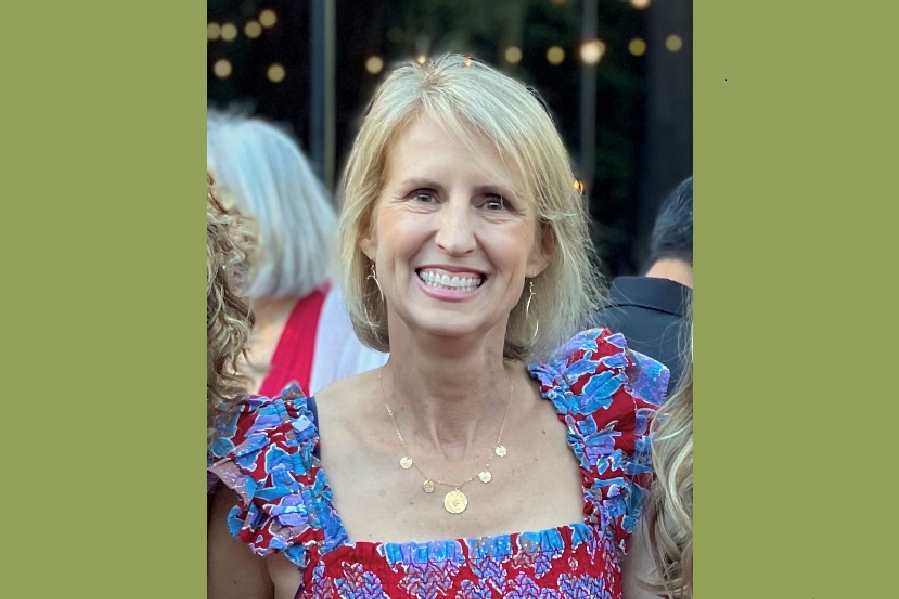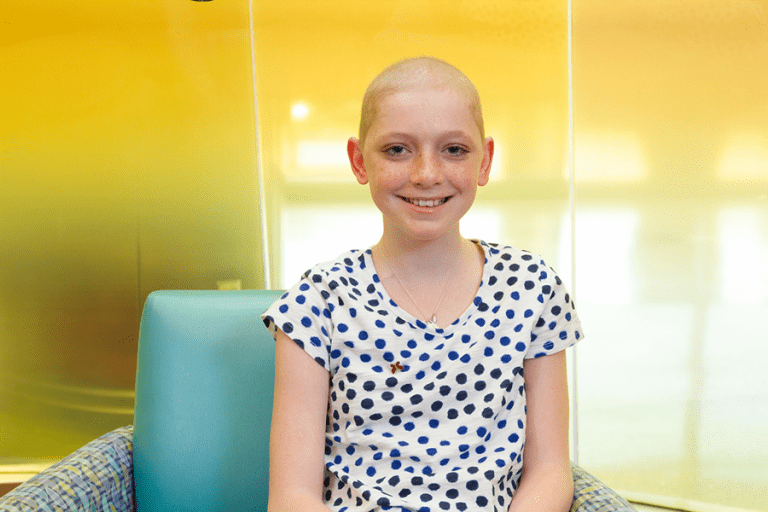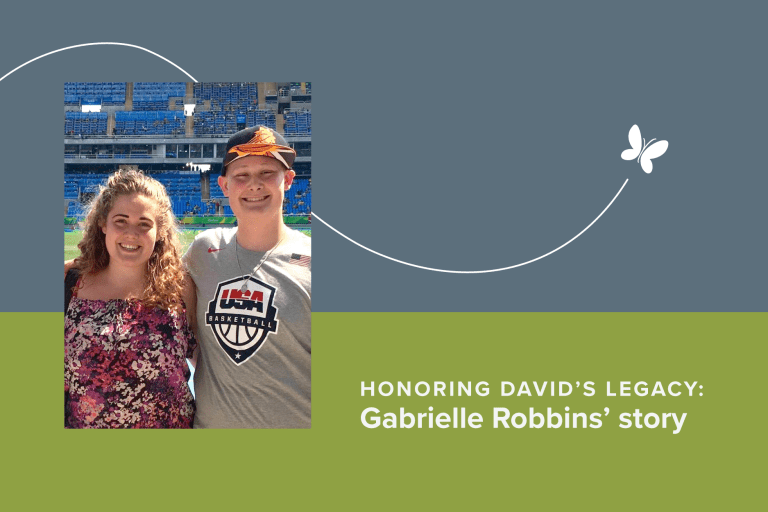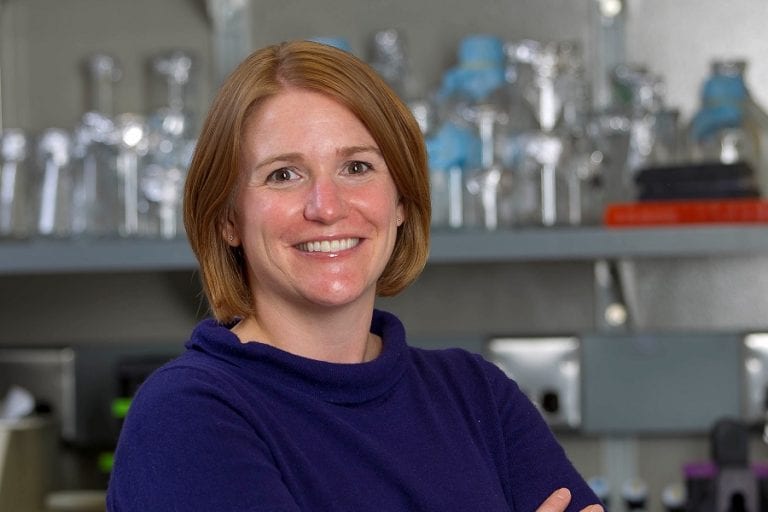Sara Maas vividly remembers walking out of her doctor’s office the day she was diagnosed with cancer. She had just returned from her honeymoon with her new husband, Jason. She was walking out of the lobby area of her primary care doctor’s office to see the hematologist, who would give her the news that she had cancer. She didn’t know the news she was about to get, but others in the office did.
“I remember it so clearly – there were three people working there, all standing, quietly, apart from each other, who stopped what they were doing and somberly watched us walk down the hallway,” Sara said. “Jason got a feeling from the way they were looking at us – we were about to get really bad news.”
Sara was diagnosed at age 29 with chronic myelogenous leukemia (CML). She didn’t know much about cancer at the time – her cousin, Katie, had passed away from a different kind of leukemia (AML) leukemia at age 13. Sara, who was only 8 at the time, remembers Katie’s contagious giggle, but she was too young to really remember or understand what was going on when Katie was diagnosed with cancer. All she knew was that at the time, she didn’t want to know what struggles cancer treatment had in store for her.
“I think some people want to be knowers, and they research everything that is going to happen to them and what the consequences would be” Sara said. “I’m just not that person. I have a low threshold for being overwhelmed I feel like this has feeling has grown over time... back then I just didn’t like bad news. I wanted to stay positive. I knew that negative statistics couldn’t possibly help my mindset. I just didn’t want to go there. I didn’t see the point in knowing the bad news, at all. So I told my doctors to tell me what they needed to tell me to sign the “let’s do this” papers, but nothing else. I’m not sure how I would have made it out the other side if I had known everything going in.”
Now a survivor, Sara wants to let others know just what it means to be a survivor of cancer – and how late-effects impact thousands of survivors, particularly of childhood cancer, today.
Life Expectancy
One thing Sara was told before starting treatment was what her life expectancy would be as a survivor. They told her she’d have a 10-year diminished life expectancy. At the time, that didn’t alarm Sara as much as some other aspects of treatment – it wasn’t until later that she learned what that would really mean. All the things that come with older age come a little bit earlier for Sara - signs of aging skin, vision changes, declining bone health... cancer treatment essentially accelerated the aging process.
“I thought okay, maybe I’ll die at 90 instead of 100,” Sara said. “I didn’t know that it meant it would slowly start coming into play earlier in my life.”
“Chemo brain”
Sara and her family joked about her having “chemo brain” during her treatment if she would forget where she put something or have a minor memory lapse. But in her adult life, Sara has discovered that chemo brain lingers for years after treatment. Her family and friends have come to be understanding when Sara forgets important dates or other details. She has trouble with executive functioning and often jumps from one thought to another very quickly.
“I’m a little bit all over the place in conversation,” Sara said. “It took a while for me to understand that this isn’t just part of my personality, this is a direct result of my treatment. In the years since my cancer treatment, researchers have figured out that we were getting a lot more chemotherapy than we maybe needed.”
Today, thanks to further research, doctors are able to more accurately pinpoint the safest effective dose of chemotherapy to avoid “chemo brain” and other issues caused by chemotherapy, like loss of hearing, neuropathy or fertility issues. In survivors of childhood cancer, specialized doctors can keep an eye out for late effects like this and take them seriously from the start, which can lessen or even prevent them.
What we can do for survivors now
Sara and her family have funded childhood cancer research for years – her experience with her cousin, Katie, and her own cancer experience have shown Sara how big the problem is and how much progress can be made by funding research. But Sara says she once struggled with the fact that so much of this research didn’t come in time to help her.
“You see those people on the news who have gone through a tragedy, and it fuels them to make sure that tragedy doesn’t happen to other people… and I think that’s amazing,” Sara said. “I think it’s incredible that they can face that every day and not be angry that help wasn’t there for them. It’s 20 years later for me now, and I’m so happy I can be a part of supporting survivorship.”
Today, Sara knows children in her own life who will be helped by survivorship research. She knows how hard survivorship has been for her, as an adult cancer survivor, and gets emotional when she thinks about the difficulties younger kids with cancer will face for even more of their lives. A family friend of hers has a daughter who survived a brain tumor – Sara thinks of little Eleanor when she advocates for better survivorship care and research.
“Her parents have been told all these milestones that they shouldn’t expect her to meet as she grows up… I get really emotional thinking about that. I hate to think about her struggling. She isn’t going to even remember cancer, but she and lots of other kids will have these health challenges to deal with for their whole lives.”
Sara wishes more people understood the struggles that come with surviving cancer, but what she most wants people to know is that it doesn’t have to be this way. With fully funded survivorship research and dedicated follow-up care, doctors can make sure kids and families are informed about the late-effects of treatment, and have access to the care they need to prevent them, lessen them or adapt to them. Sara knows reaching survivorship isn’t the end of the cancer story.
“There’s so much educating we can do so people understand the difference we need to make for these kids,” Sara said. “There’s a better world for cancer survivors if we can get it right.”
Your donation supports survivors
Your donation not only supports better, safer treatments for childhood cancer - it improves the lives of survivors right now and in the future. Learn more about what you can do for survivors at Dream.ChildrensCancer.org.




